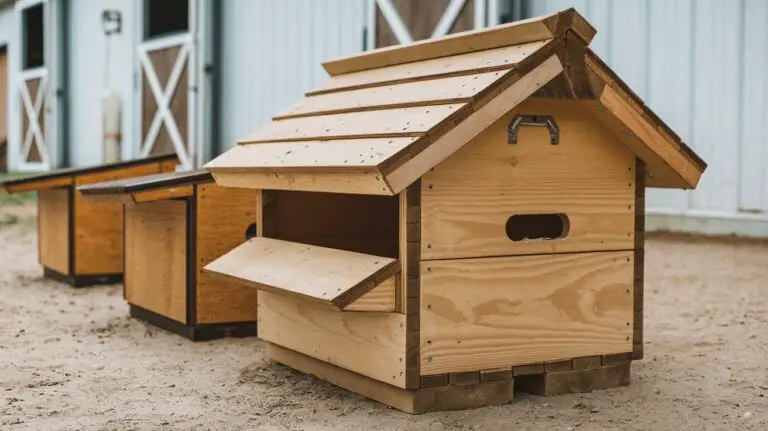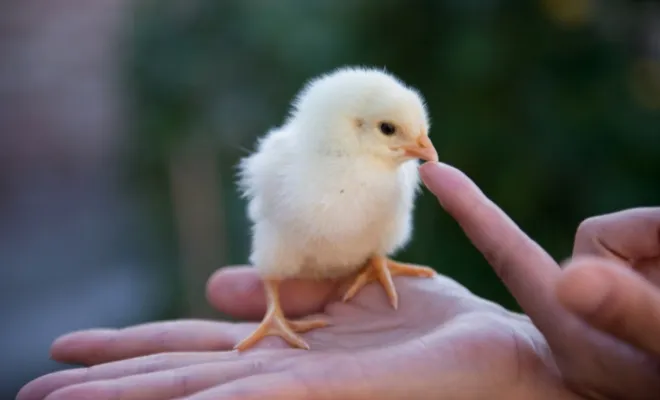Wanna See Chickens Happy? Get 21 Tips for Healthy & Happy Flocks!

Ever peek into your coop and wonder if your feathered friends are truly content? You’re not alone! Chickens are intelligent creatures with surprising needs beyond just a coop and some feed.
Now, how to have happier chickens? First, ensure they’ve got a safe shelter with plenty of space to roam around. Keeping their coop clean and providing a secure area is also important. Besides, offer them enough food and water access. Lastly, remember that chickens love socializing too! Spend time with them, and let them interact with other chickens.
Want to know more tips for happy chicken? Follow the included tips and details in the rest of the article! Let them cluck with contentment!
Table of Contents
21 Things to Have Happier Chickens in the Yard!

Chickens are full of personality and deserve a happy, healthy home. But how to have happier chickens? Don’t worry, chicken caretaker, we’ve got you covered!
1. Spacious Coop
Chickens need room to roam. Check the recommended square footage per bird. It’s to ensure ample space for scratching, pecking, and flapping their wings.
Different breeds of chickens have varying space requirements. Standard breeds need 4 square feet of space per bird in the coop. While heavier breeds require 8 square feet per bird in the coop. Also, 16 square feet per bird in the run is good.
2. Cleanliness is Key
Regularly clean your coop to prevent odors, ammonia build-up, and the spread of diseases. Consider the deep litter method where bedding builds up naturally.
3. Shelter from the Elements
Provide a secure coop that protects your chickens from rain, wind, and sun exposure. This includes proper ventilation for fresh air circulation without drafts.
4. Private Nesting Boxes
Hens need a quiet, secluded space to lay their eggs. Offer enough nesting boxes for your flock, filled with comfortable bedding like wood shavings.
5. Roosting Perches
Chickens are natural roosters. Install sturdy perches at varying heights inside the coop for them to sleep comfortably at night. They find it comfortable staying in perches.
6. Sunshine Power

Sunlight provides essential Vitamin D for chickens. Design your coop with windows or a run that allows access to sunshine for a portion of the day. It’s crucial!
7. Fresh Air Flow
Proper ventilation is crucial. Stale air can lead to respiratory problems. Ensure your coop has adequate ventilation without creating drafts.
8. Appropriate Food Ratio
Provide a balanced diet formulated for laying hens. This ensures they receive the proper nutrients for egg production and overall health.
Provide clean water, suitable food, and free-choice calcium supplements like oyster shells or ground eggshells. Also, supplement their diet with fresh greens and occasional treats like fruits or yogurt.
However, Chickens require 1/4 pound of food per day when fully grown.
9. Treat Time!
Treats are a great way to add enrichment and keep your chickens entertained. Scatter grains in the run to mimic natural foraging. Or hang treats like cabbage or herbs for them to peck at.
I found fruits are amazing treats! So, offer them nutritious fruits like apples, bananas, berries, watermelon, and more.
Take enrichment a step further by hanging treats like vegetables or fruits. Chickens love the challenge of reaching and pecking at these suspended snacks.
10. Fresh Water Always
A clean, readily available water source is vital for chicken health. Regularly clean and refill their water to keep it fresh and prevent dehydration.
11. Scattered Grains as Enrichment

Mimic natural foraging behavior by scattering grains throughout the coop or run. This encourages scratching and pecking, keeping your chickens mentally stimulated.
You can add sprouting seeds like wheat, barley, or oats as a nutritious and fun activity for chickens.
12. Dust Baths
A dust bath is essential for chickens. This allows them to maintain healthy feathers by removing mites and keeping their feathers in top condition. Create a dedicated dust bath area filled with sand, dirt, and wood ash.
13. Hay Bales & Straw
Hay bales and straw provide another layer of enrichment. Chickens love to peck, scratch, and explore these materials, keeping them entertained and active.
14. Exercise Opportunity
Free-ranging is ideal, allowing chickens to explore or forage their natural instincts. If that’s not possible, create a spacious, secure run where they can exercise and forage for bugs and greens.
15. Other Chickens
Chickens are social creatures and thrive in flocks, especially hens. Consider keeping multiple hens together to fulfill their social needs. As they’re social, they always prefer mates near the surroundings.
16. Spend Time Together

Don’t underestimate the power of human interaction. Regularly spend time with your chickens, talk to them gently, and offer them treats to build a positive bond.
17. Monitor for Unhappiness
Observe your chickens for signs of unhappiness like lethargy, lack of dust bathing, or decreased appetite. This can indicate health problems or environmental issues that need addressing.
18. Chicken Boredom Busters or More Entertainment
Chickens are curious creatures so you can offer them an entertaining section. Boredom busters play a great role here!
Invest in safe chicken toys made from materials like wood, plastic, or woven materials. Look for options like pecking toys, hanging xylophones, mirrors, or foraging balls filled with treats.
Install a sturdy chicken swing in the coop or run using a wide branch or board suspended with rope. This provides your chickens with a fun activity and a different perspective on their surroundings.
You can also get creative with DIY options like cardboard boxes filled with treats or crumpled paper. Rotate these items regularly to maintain your chickens’ interest and keep them entertained.
Follow the video to get more ideas!
19. Keeping Them Stress Free & Protect from Predators
Predators are always ready to attack your feathered friends. Protecting your chickens from predators and sudden environmental changes is crucial. It’s to prevent stress-induced disruptions in egg laying.
Safeguard your coop from threats like hawks, foxes, raccoons, bears, coyotes, and snakes. Utilize a double layer of fencing or chicken wire to cover the coop’s top. It prevents aerial predators from gaining access.
20. Chicken Health Check
Always check the health condition of your chickens!
For example –
- Are they active and alert, or lethargic and withdrawn?
- Are they eating and drinking normally?
- Are their feathers clean, shiny, and free of mites or parasites?
- Are their eyes bright and clear? Are their nostrils clean and free of discharge?
- Are they a healthy red color, or pale and floppy?
I would say, conduct these checks weekly or bi-weekly, depending on your flock size and comfort level. If you suspect a chicken is unwell, isolate it from the flock and consult a veterinarian if necessary.
Remember, regular health checks can help identify problems early.
21. Research Chicken Care
Continually educate yourself on proper chicken care. There’s always more to learn about their specific needs and preferences. It helps to get more ideas for their enrichment.
You can see the following video to get more ideas about keeping happy chickens.
How Can I Tell If My Chickens Are Happy?
You understand what makes the chickens happy. But how can you tell if your efforts are paying off? Here are some key signs you can check out –
Signs of Happy Chickens
- Happy chickens are active and alert. You’ll see them engaging in behaviors like scratching, pecking, and exploring their coop and run.
- You’ll see them regularly taking dust baths.
- Spending time preening feathers shows a chicken is relaxed and in good health.
- Consistent eating and egg laying (for hens) are signs of happiness and proper nourishment.
- Content chickens make soft clucking sounds.
- A happy flock is comfortable around humans and may even approach for treats or attention.
Signs of Unhappiness of Chickens
- Listless behavior or hiding suggests sickness or stress.
- Less scratching and pecking may signal boredom or discomfort.
- Avoiding dust baths could indicate health issues.
- Dull or matted feathers may indicate poor health or stress.
- Unhappy chickens may exhibit increased aggression towards each other or humans.
- Sudden drops in eating or egg laying can indicate health problems or stress.
Related Article: Guides to Build a Chicken Playground
FAQs
Want to learn more about Happy Chicken? Have a look at the following queries!
Q. How do I get my chickens to like me?
Spend time with them, talk softly, and offer treats! Regular interaction builds trust and a positive bond.
Q. Is rice OK for chickens to make them happy?
Cooked rice in small amounts is okay as a treat, but not a dietary staple. Stick to formulated feed for balanced nutrition.
Q. Do chickens like a fan?
Yes, on hot days! A fan can help circulate air and keep your chickens cool. Just ensure it’s not blowing directly on them.
Q. Do chickens like being touched?
Some chickens enjoy gentle petting, especially on their heads and backs. Let them approach you first and respect their boundaries.
Q. What do chickens love most?
A safe, clean coop with access to food, water, dust baths, and space to explore. Plus, your attention and yummy treats!
Conclusion
So, how to have happier chickens? It’s all about understanding their needs and providing the right environment. Make sure their coop is spacious and clean, with proper shelter from the elements. Offer a balanced diet with treats to keep them satisfied but not overfed.
Also, be sure you spend time with them and encourage interaction with their flock mates. And keep an eye out for signs of unhappiness. By applying these tips, you’ll surely have content chickens in the yard!






